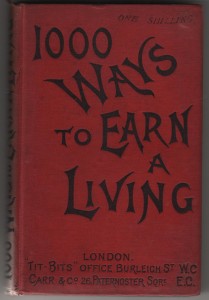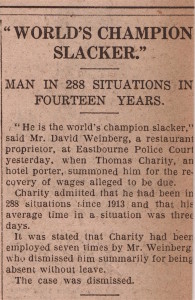According to 1,000 Ways to  Earn a Living (1888) these were the highest and lowest earners in that year.
Earn a Living (1888) these were the highest and lowest earners in that year.
Highest. (sorted highest to lower; highest rate of remuneration quoted)
A ‘star’ equestrian rider in a circus, £100 pw.
National newspaper editor, £2,000 per annum
Leader writer, London newspaper, £1,500 per annum
Drapery buyer, £1,000 per annum
Inspector of Mines, £1,000 per annum
Novelists, possibly £1,000 per book
Lowest ( sorted lowest to higher; lowest rate of remuneration quoted)
General servant in home (female), £8 per annum
Junior hospital nurse, £8 per annum
Feather-maker, 3.6d per week
Waitress, 5s per week
Barmaid, 7s per week
Lifter-up (boy)at printers, 7s 6d per week
Female library assistants, 7s 6d per week
Footman, 8s per week
Groom, 8s per week
Collar-maker, 8s 6d. per week
False teeth maker, 15s per week.
[RR]
 A clipping taken from the August 16th issue of the Daily Express for 1927, reported that David Weinberg, a restaurant owner, had been summoned to Eastbourne Police Court for the recovery of wages allegedly due to Thomas Charity, a hotel porter. Weinberg stated that he had employed Charity seven times before dismissing him summarily for being absent without leave. Weinberg called him ‘the world’s champion slacker’. When asked for his employment record Charity admitted that he had been in ‘288 situations since 1913 and that his average time in a situation was three days ‘. The case was dismissed.
A clipping taken from the August 16th issue of the Daily Express for 1927, reported that David Weinberg, a restaurant owner, had been summoned to Eastbourne Police Court for the recovery of wages allegedly due to Thomas Charity, a hotel porter. Weinberg stated that he had employed Charity seven times before dismissing him summarily for being absent without leave. Weinberg called him ‘the world’s champion slacker’. When asked for his employment record Charity admitted that he had been in ‘288 situations since 1913 and that his average time in a situation was three days ‘. The case was dismissed.